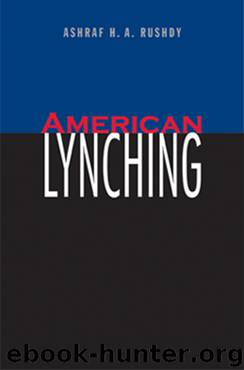American Lynching by Ashraf H. A. Rushdy

Author:Ashraf H. A. Rushdy
Language: eng
Format: epub
ISBN: 9780300181388
Publisher: Yale University Press
What, then, is this lynching for rape discourse, what are its terms, its logic, its source of appeal? As with any myth, the discourse is largely a product of popular imagination rather than intellectual labor, a form of knowledge more the result of the accumulation of informal stories than any formal course of study. It also operates in the same way as popularly generated knowledge, by evocation, by connotation, more than by systematic or direct means. There were some intellectuals, however, who did make a concerted effort to mount a comprehensive case for the discourse and they prove invaluable in revealing the connections and associations explicitly in their writing that the majority implicitly make in their minds.
Thomas Nelson Page provides a paradigmatic case of an intellectual who synthesized and put into a complete and contextual framework the lynching for rape discourse. In a book published in 1904, Page, the best-selling and most successful Southern novelist in the last quarter of the nineteenth century, renounced his earlier novelistic representations of African Americans as simple and devoted retainers and fully committed himself to the black rapist myth.15 The argument he makes depends a great deal on certain rhetorical maneuvers, a strategy of implication, a backhanded way of making insidious associations, and some unsubtle innuendo. It is, in other words, a mendacious effort to give coherence to what, at certain revealing moments, even Page himself seems not to believe.16
The major rhetorical structure of the argument is fairly straightforward. Page begins by constructing a syllogism: white Southerners lynch rapists, black men commit rape, and therefore white Southerners lynch black men. Thereafter, Page offers two historical accounts (one of the rise and evolution of rape, the other of the rise and evolution of lynching), and then he provides two sociological interpretations (explaining the social conditions that make black men rape and white men lynch). The structural logic of Page's text serves a greater purpose since part of his whole enterprise is to create the illusion of parallel activities (rape/lynching), parallel sympathies (blacks' for rapists, whites' for lynchers), and ultimately parallel responsibilities (blacks' for ending rape, whites' for ending lynching). This parallelism gives the appearance of being evenhanded and fair while not so subtly creating a nefarious set of associations that place the full blame for black rapists on all black people and, in the end, indicting the religious, intellectual, and cultural values of African American life as essentially fostering and cultivating rapists.
From the outset, Page is aware of the flaws in his syllogism since lynching was not confined to those who would avenge acts of rape. By 1904 it had been made eminently clear that lynching was a response to a variety of alleged crimes and perceived violations of racist mores (of which less than one-quarter were allegations of rape). Nonetheless, Page circumvents these facts by consistently presenting rape and lynching in a cause and effect relationship. He talks about rape as “the brutal crime which has largely brought about the frightful crime of lynching” he produces an image of “ravishing and lynching spreading like a pestilence over the country.
Download
This site does not store any files on its server. We only index and link to content provided by other sites. Please contact the content providers to delete copyright contents if any and email us, we'll remove relevant links or contents immediately.
| General | Discrimination & Racism |
Nudge - Improving Decisions about Health, Wealth, and Happiness by Thaler Sunstein(7706)
The Fire Next Time by James Baldwin(5444)
iGen by Jean M. Twenge(5415)
Adulting by Kelly Williams Brown(4574)
The Sports Rules Book by Human Kinetics(4386)
The Hacking of the American Mind by Robert H. Lustig(4382)
The Ethical Slut by Janet W. Hardy(4251)
Captivate by Vanessa Van Edwards(3839)
Mummy Knew by Lisa James(3691)
In a Sunburned Country by Bill Bryson(3542)
The Worm at the Core by Sheldon Solomon(3487)
Ants Among Elephants by Sujatha Gidla(3467)
The 48 laws of power by Robert Greene & Joost Elffers(3291)
Suicide: A Study in Sociology by Emile Durkheim(3022)
The Slow Fix: Solve Problems, Work Smarter, and Live Better In a World Addicted to Speed by Carl Honore(3009)
The Tipping Point by Malcolm Gladwell(2921)
Humans of New York by Brandon Stanton(2873)
Get What's Yours for Medicare: Maximize Your Coverage, Minimize Your Costs by Philip Moeller(2729)
Handbook of Forensic Sociology and Psychology by Stephen J. Morewitz & Mark L. Goldstein(2705)
